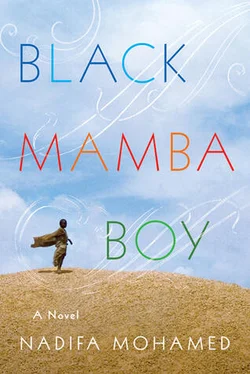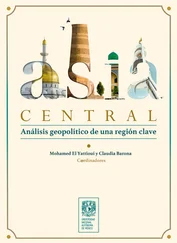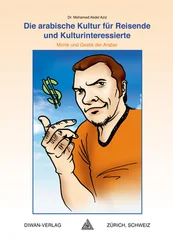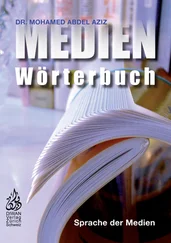Jama ran to the train and Awrala pulled him back, scared it would hurt him. “Let me touch it,” he exclaimed.
Wrenching his arm away from her, he stroked the side of the locomotive. Watched by the Italian engineer and Eritrean fireman inside the engine car, the little boy greeted the man-made snake. The inside of the train’s head contained shiny brass instruments, glass circles with fluttering needles and a big leather seat. Behind him came the sudden, shrieking call of the train’s whistle, and he jumped, his feet rising from the ground in shock. He turned back to the engine and the two men waved.
As they walked the length of the train, the carriages got less grand, the number of seats increased, the vases on the tables disappeared, and when Awrala stopped they stood next to the last carriage. She had bought his ticket and he thanked her quietly as she gave it to him, he knew that she didn’t have much, and he made a mental note to ask his father to repay the money. She waited for him to find a wooden bench and then left, propelling herself through the crowd. The carriage quickly filled up, people sat on the floor, stood wherever they could, held their goats between their knees, stuffed squawking chickens into the overhead storage.
Jama fidgeted, worried that his bladder would get too full and he would end up wetting himself. The final whistle shrieked and the train juddered to a slow start. Jama sat next to the window and watched as Asmara, green and calm, disappeared into the distance. He thought sadly of Awrala resting underneath its earth one day, unable to enjoy her beloved hills. Tall, regal trees lined the tracks and little villages flashed by the window, as did shepherds leading fat brown cows through fields and glades. Shimmering streams meandered across fields, birds waded along their banks while women bathed. Children chased one another on their way to school, along the roads flanking the massive Italian-owned plantations, the land suddenly dominated by wheat for miles. As the track climbed higher, the land became dustier and drier. Jagged gray mountains pierced the sky, isolated tukuls nestled in their hearts.
The train tracks worked their way along fine, crumbly mountain paths, a dead donkey or camel sometimes lying far beneath them. Everywhere Jama looked there was another giant mountain, rippling with muscular strength, each competing with the next in attaining proximity to heaven, as God had enjoined his creation to do. The peaks looked ascetic with heads shaved of greenery, having long forgone water and the pleasures of life, silently awaiting the day when Allah would bless them for their piety. “Manshallah, praise the Lord,” uttered Jama, awed by God’s genius. All around him was paradise, full of what was good in the world as well as bad. Life is just this, Jama thought, a long journey, with lightness and darkness falling over you, companions all around on their own journeys. Each person sitting passively or impatiently, wondering whether the tracks of their fate would take them on a clattering iron horse to their destination or would sweep them away on an invisible path to another world.
At Keren, many of the passengers got off, eager to get to the great market before it became crowded. The sweatiness inside the carriage got off with them and Jama stretched out his legs for the rest of the journey to Agordat. After Keren, the train began a long descent down to the plains and the heat rose again. The train screeched down the escarpment. The wheels against the tracks sounded like knives being sharpened and the metallic hiss put Jama’s teeth on edge. A young Eritrean man played idly on a stringed rababa. It sounded like an angel’s harp, and Jama turned to watch him play for a while. The rocking of the train made Jama’s eyes heavy but he was too excited to sleep.
The train inched into the small station of Agordat, its sleek paint coated in fine brown dust, steam glistening over the black locomotive like perspiration. Jama disembarked. A large mosque dominated the skyline of the simple town and a bustling market was already in full swing. The turbans and Arabic arches reminded him of Aden. The only people he could see not wearing turbans were dressed in long, beautifully colorful shirts with ballooning trousers, selling crocodile skins. Jama approached them. “As-salamu alaykum, where can I get a bus to Sudan?” he asked in Arabic.
The reply was heavily accented, full of tahs and ehs. “Past the suq, there is a main square where the buses leave from, but it will only take you as far as Omhajer, you will have to get a lorry across the border.”
Jama became curious. “Where are you from, sahib?”
“I’m Takaruri, from a place called Kano, a Muslim place on the other side of Africa. Fifty years ago my grandfather and his people passed through many countries on their walk to Mecca. By the time they reached here, they had run out of food and money, so they settled, hoping to make enough money to cross to Arabia. By Allah’s command, one day we will.” The man laughed.
“How far is it from here to this Kano?” pursued Jama.
“Three years’ walk,” said the man, his face somber.
The square was a dun-colored plot of land, empty of people apart from two Eritrean askaris and a coffee seller. A small rusted bus baked in the sun, and two white-eyed gulls watched the scene from a telegraph wire, the red of their beaks looking painted-on amid the ocher-and-khaki dourness of the square. The driver turned up after the sun had passed its zenith, his trousers and vest gaping with holes, a peaked hat on his head. He didn’t acknowledge anyone but boarded the bus and stretched across the backseat to sleep, covering his face with a handkerchief. Jama felt his head pounding from the sun; sharp pain skewered him from temple to temple, his tongue was parched and swollen. He bought water from a vendor and watched a young woman enter the bus depot, a metal suitcase in her hand. A unit of young Italian soldiers marched in behind her. White light reflected violently from the suitcase, panning over him and the Italians like a searchlight. The bus coughed into life and Jama and the woman rushed to be first on; the driver held his arm across the door, blocking their way, and gestured to the soldiers. Jama didn’t comprehend and jumped aboard when the driver’s arm dropped. The driver approached, shouting and jabbing his finger in Jama’s face, gesticulating to the rear seats. Jama turned his face away and blanked him out, the driver grabbed him by the wrist and tried to pull him up, and Jama slapped his hands away and spat in return. The Italian soldiers watched the commotion; some laughed, most just stared. The driver led Jama to the door and pushed him out of the bus. He landed squarely on his feet and unleashed a torrent of abuse in Somali at the driver and the watching soldiers. “Baboons, what you looking at? May Allah break your spines, you debauched donkey fuckers.”
The soldiers boarded the bus. An Italian with the long limbs of a spider got on last and spoke to the driver, his dark eyes following Jama as he paced around. The driver shook his head but the Italian continued whispering in his ear. Eventually the driver relented and called over to Jama, reeling him in with his arm. Jama hesitated, his anger seething like a nest of snakes. The driver escorted Jama to the back; the gangly Italian smiled as he walked past, his dark eyes framed by thick black eyelashes. Jama gave him a small smile in return. When he was seated safely in the blacks’ seats the driver held out his hand, rubbing his fingers together. Jama counted out a reasonable fare and gave it to him. The driver held up the money to the soldiers and ridiculed him; he started gesturing to the door again so Jama gave him double the amount. Crestfallen, he counted out the remaining money in his lap with hunched shoulders. The sister fucker had bankrupted him.
Читать дальше
Конец ознакомительного отрывка
Купить книгу












